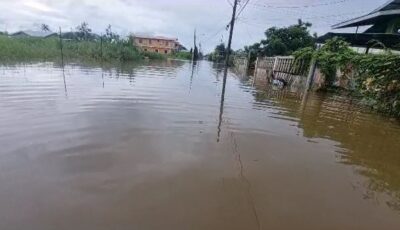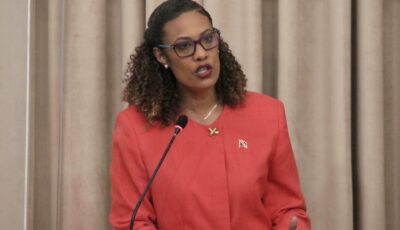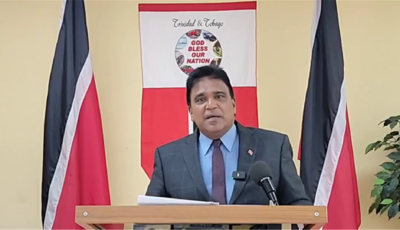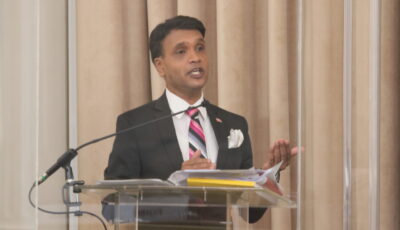HEADLINES
Commentary
Rowley strenuously objected to the construction of Penal-Debe UWI Campus
The media is reporting that the UWI Penal-Debe Campus, built during the People’s Partnership Administration continues to sit empty and has never
Posted On 30 Oct 2023
Blighted WGTL Project continues to haunt PNM
That World Gas-to-Liquids project is another of the many PNM scandals and failed projects which has cost taxpayers billions of dollars! And it is
Posted On 22 Jun 2023
Who financing Balisier House?
Ferdinand Ferreira, a founding member of the People’s National Movement (PNM), is quoted in the media as saying that the party has always
Posted On 03 Apr 2023
UNC SENATORS DEFENDED THE PARTY WELL TODAY
Today, the Opposition UNC Senators defended themselves and the Party well from the frivolous, anti-democratic motion by Senator Anthony Viera.
Posted On 22 Feb 2022
COVID WORKERS FIGHTING A WAR WITHOUT THEIR PROPER WEAPONS
We congratulate Kamla Persad-Bissessar on her success in forcing the Government to conduct an inquiry into the handling of covid. We take this
Posted On 20 Feb 2022
Letters
For fools rush in where angels fear to tread
The National Security Minister’s recent unrestrained language and conduct towards judges and unjustified criticisms of their judicial functions
Posted On 14 May 2023
Seek a fresh mandate
I recently read in one of the daily newspapers that Minister of National Security Fitzgerald Hinds said that 70% of society wants to see him
Posted On 27 Dec 2022
Don’t Blame God for Rowley’s Dotishness
Prime Minister Keith Rowley at the PNM convention on December 4, 2022, announces a National Day of Prayer. He said the country must come together
Posted On 16 Dec 2022
Keith Rowley has betrayed the sanctity of Parliament
Dear Editor, The revelation by the Commissioner of Police that the emails which Keith Rowley, then Opposition Leader read in our nations
Posted On 19 Jul 2019
T&T owes Kamla a debt of gratitude
Kamla Persad-Bissessar did what many were not expecting… she and her MPs voted unanimously with the Government to ensure passage of the Civil
Posted On 09 Apr 2019
Press Releases
Tancoo: Flooding imminent as Government fails to act
After a couple days of scattered “April showers” earlier this week, MP for Oropouche West, Dave Tancoo is again warning that severe flooding in
Posted On 06 Apr 2024
MP Khadijah Ameen wants justice for Kiss Driver’s death
Member of Parliament for St. Augustine, Ms. Khadijah Ameen is calling for justice for the death of Kiss delivery driver, Neil Ballai. Ballai was
Posted On 06 Apr 2024
UNC’s Persistent Pressure Forces Rowley Gov’t to Release 2024 EBC Report
On the heels of intense, consistent pressure from the UNC over their highly questionable refusal to lay the 2024 EBC Boundaries Report in
Posted On 06 Apr 2024
Moonilal: Hinds Fails Fire Service, Lives at Risk as Equipment Crumbles
The collapse of the Trinidad and Tobago Fire Services is another crushing indictment on the spectacularly failed Fitzgerald Hinds as Minister of
Posted On 05 Apr 2024
Padarath: Gov’t Electricity Rate Hike “Unbearable Burden”
Princes Town MP, Barry Padarath said that the contents of a report in yesterday’s Business Guardian headlined “RIC Recommends
Posted On 05 Apr 2024
Speeches
Tancoo: calls on Imbert to have a heart and indemnify the population
Today we come to you to shine some light on a very worrying development that has happened in the past few days. I am sure many of you saw or
Posted On 08 Sep 2021
Rowley’s Mad Power Grab in Tobago
My friends, we are seeing a government that is in freefall – in every single sector. Health, National Security, the business sector. And what
Posted On 16 Feb 2021
Presentation of UNC general election candidates 2020
T&T family! UNC family! It is my absolute pleasure to speak with you today, as we get ready for the sweeping victory that is to come on
Posted On 19 Jul 2020
Kamla: My vision is to build an intelligent nation
“ON THE BALLOT” UNC VIRTUAL MEETING (June 25, 2020) Introduction Good evening and thank you for joining us once again as we continue to set the
Posted On 26 Jun 2020
MNF – Kamla: There is hope
Introduction Good evening T&T! Good evening UNC family! It is good to be back! 2020 we are ready to rumble! Are you ready? Even though it’s
Posted On 11 Mar 2020
Copyright © - 2023 United National Congress







Why we have a natural gas shortage
By Kevin Ramnarine
Image Courtesy: Trinidad Guardian
In my four years as Minister of Energy, the biggest problem I faced was the shortage of natural gas. The Prime Minister has said we failed to deal with it. This is not correct. In fact, had we not taken the action we took, the country would be in a far worse position. To say we failed to deal with it is also a condemnation of the four upstream natural gas producers.
This problem first reared its head in late 2010. It continued over the years and is still with us today. In 2010, the country recorded its highest ever natural gas production of 4.3 billion cubic feet per day. Not coincidentally, in 2010 BP recorded its highest ever production and its lowest level of investment.
In 2015, gas production had fallen to 3.8 billion cubic feet per day or a decline of 11.6% compared to 2010. In 2016, natural gas production collapsed to 3.3 billion cubic feet per day or a 13% decline. A 13% decline in one year is huge.
If I were a typical politician I would blame the PNM for the 13% decline from 2015 to 2016. I could for example say, “When I left office gas production was 3.8 billion cubic feet per day and now it is 3.3 billion cubic feet per day – the PNM is to blame.” I would never do that. I respect the intelligence of the population too much to arrive at such superficial conclusions.
Last week, in response to a statement in Parliament by the Prime Minister, I issued a press release in which I outlined three reasons why we have a natural gas shortage.
These reasons were:
1. A collapse in upstream related foreign direct investment from 2008 to 2010.
2. Maintenance by BP and to a lesser extent other companies from 2010 to 2014.
3. The NGC’s over contracting of supply from 2007 to 2008.
There is also the argument that when we committed to build a fourth LNG train we committed the country to an unsustainable level of gas demand.
A few days ago, while on i95.5 FM, the Prime Minister responded to my release and the related story. He appealed to the country not to listen to me. He took issue with the first and third points above.
On the first point, he said this was due to the global recession of 2008 to 2009. I have proffered a different thesis.
Records of the Ministry of Energy show that during that time, the Government had threatened to increase taxation on natural gas. This has been corroborated by industry sources. It was counter to what the industry was telling the then Manning government – the oil and gas business was already heavily taxed. The result was a withdrawal of enthusiasm and movement of investments to other countries. Such a threat was an error with grave consequences.
The second point is maintenance. In recent social gatherings with energy sector professionals I have heard from them the following statements, “They really don’t know that when you have maintenance work on platforms we must shut in gas production?”
Listening to the Government in Parliament, they believe that platform maintenance and the natural gas curtailments are mutually exclusive events. The maintenance programme by BP happened mainly from 2011 to 2014 and it severely interrupted natural gas supply. These are incontrovertible facts that can be overwhelmingly substantiated.
The third point has to do with the NGC’s over contracting of natural gas supply during 2007 to 2008. The PM seemed not to understand what I meant by that. He related it to the Mitsubishi project which had to do with contracting demand not supply.
Let me explain. From 2007 to 2008, the NGC signed three gas supply contracts with BG, BHP and EOG Resources for approximately 550 million cubic feet per day of natural gas.
This new gas was contracted to supply new customers including Alutrint and Essar. These customers never materialized and the NGC was left holding the wrong end of the stick.
By mid-2010 when the Government changed the then President of the NGC advised the Ministry of Energy that the biggest threat to the NGC was this oversupply situation which resulted in a take or pay liability for the company. That meant that NGC had to either take gas from the upstream companies or pay.
As a result of its over supply and take or pay conundrum, in 2010, the NGC told BP that it would require a reduced supply of natural gas. As a consequence, by the third quarter of 2010, BP had no rig drilling offshore. At around the same time the oil spill in the Gulf of Mexico happened and BP faced an existential threat. That oil spill caused the company to go into maintenance mode not only in T&T but all over the world.
The maintenance programme lasted over three years and caused the disruption of the supply of natural gas.
All three events converged around the same time to create the perfect storm.
If the Prime Minister and his Ministers don’t want to believe me for whatever reason – politics, denial, self-imposed ignorance they are welcomed to read the verbatim of Frank Look Kin at the Joint Select Committee on State Enterprises (May 9th 2016).
Kevin Ramnarine is a former Minister of Energy of Trinidad and Tobago
Share this:
Like this:
WHY WE LOST ANGELIN
RELAX THE TAX
Commentary
Rowley strenuously objected to the construction of Penal-Debe UWI Campus
Blighted WGTL Project continues to haunt PNM
Who financing Balisier House?
UNC SENATORS DEFENDED THE PARTY WELL TODAY
COVID WORKERS FIGHTING A WAR WITHOUT THEIR PROPER WEAPONS